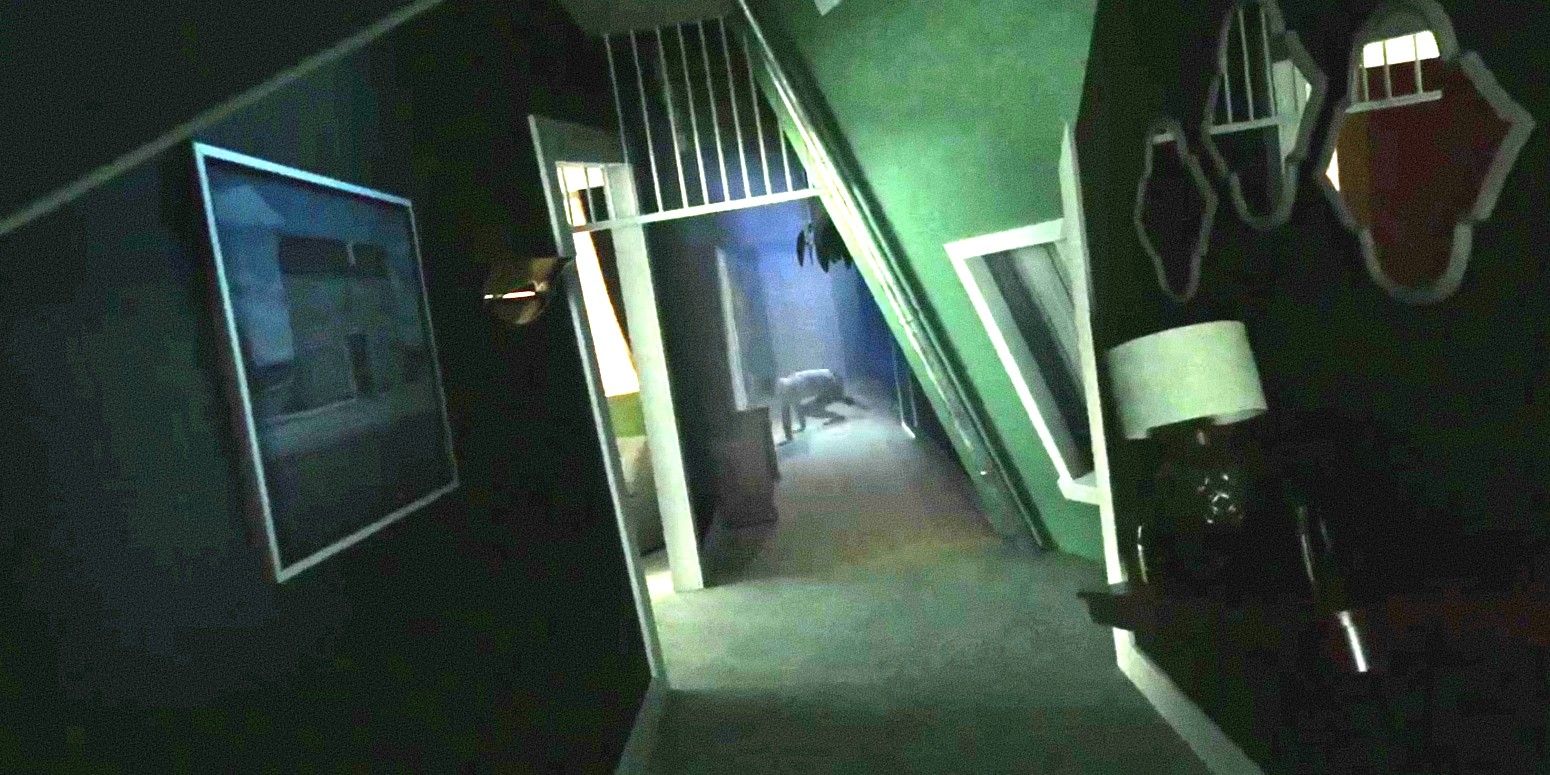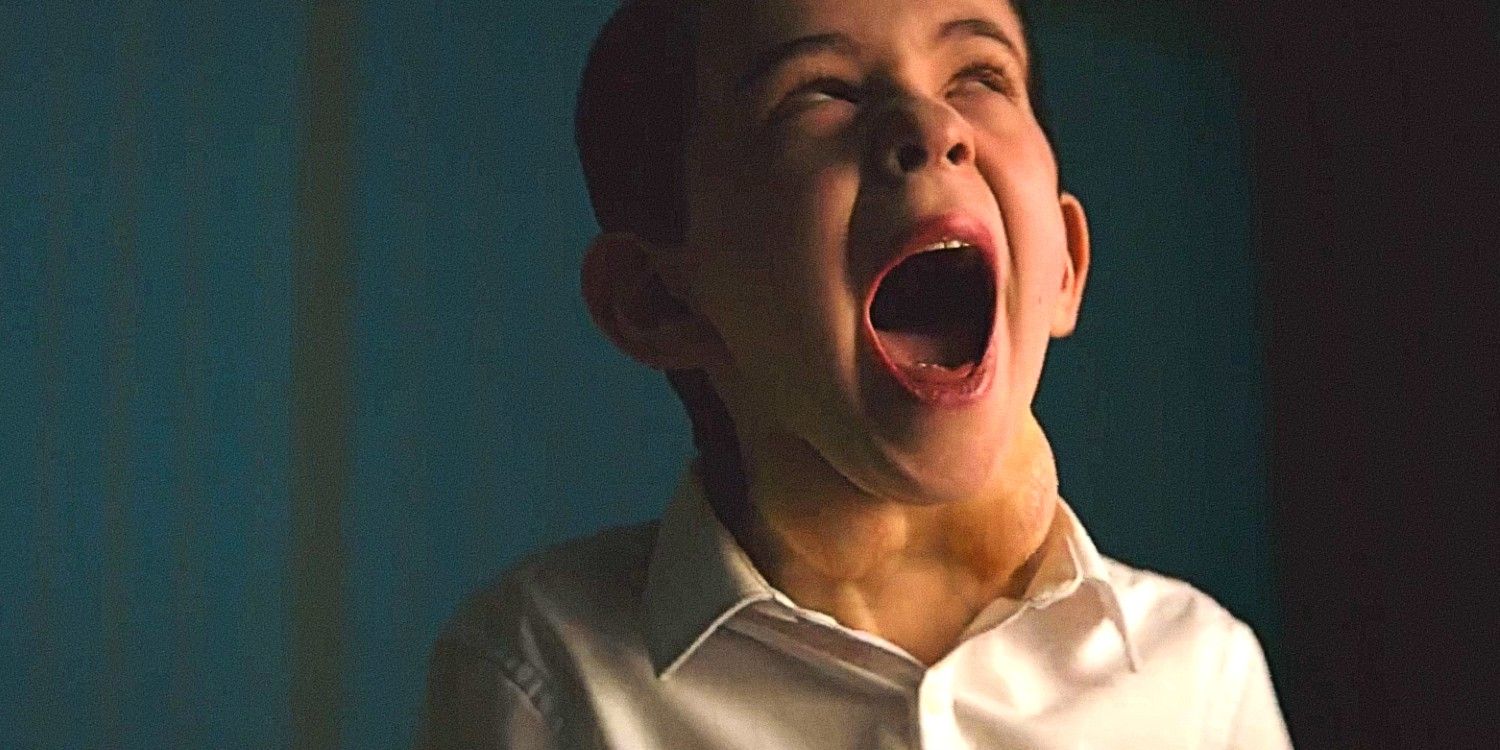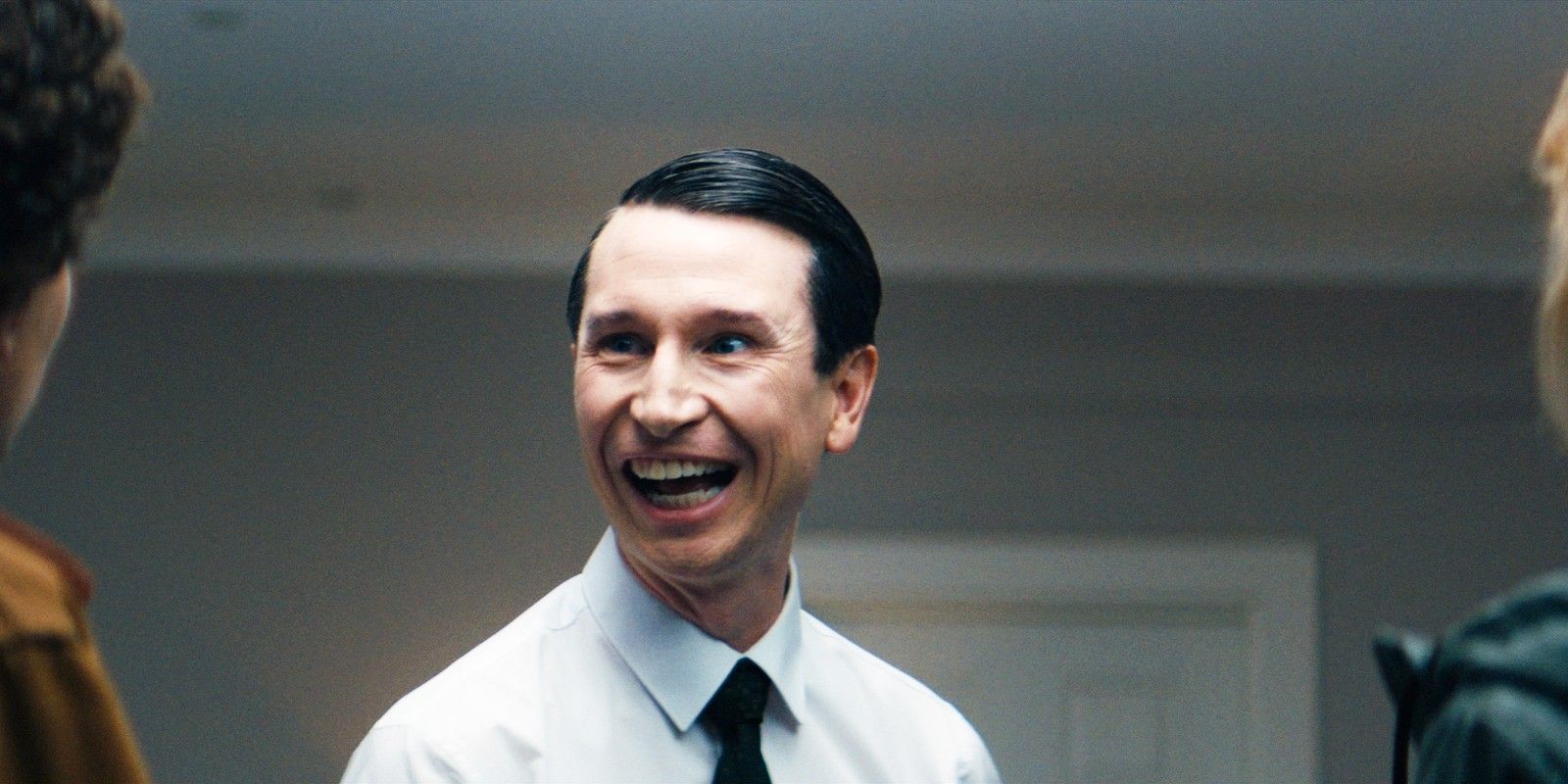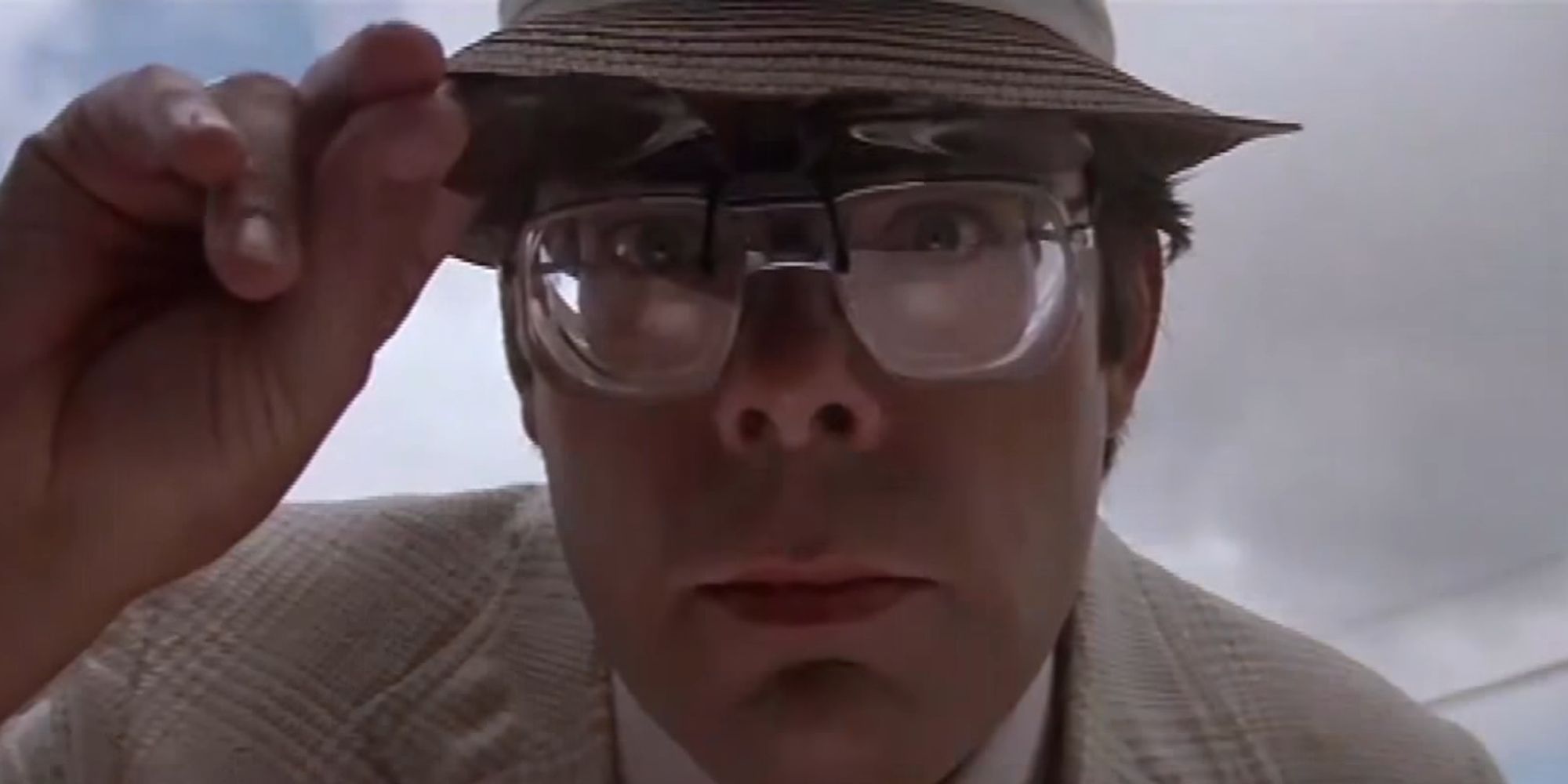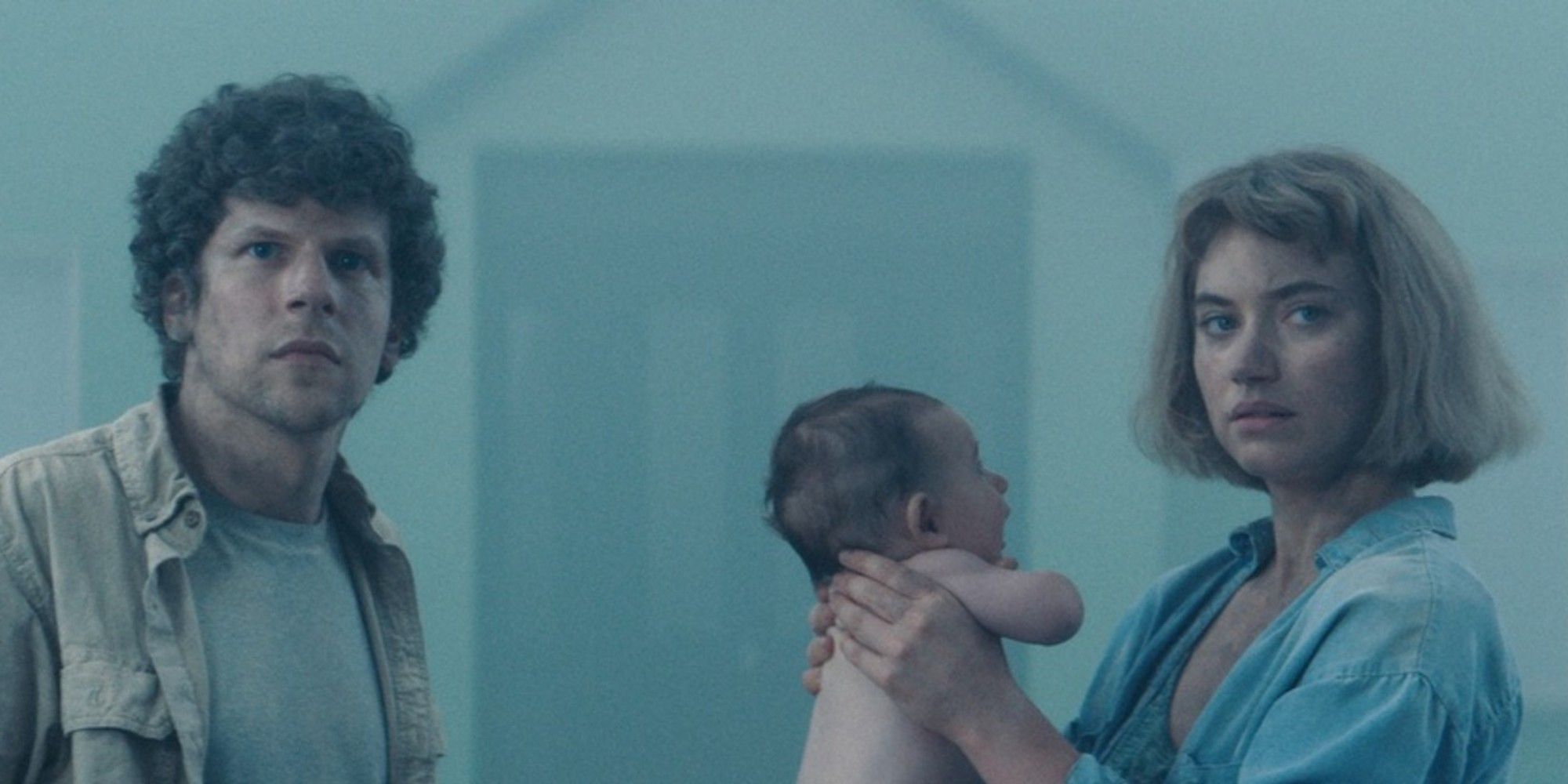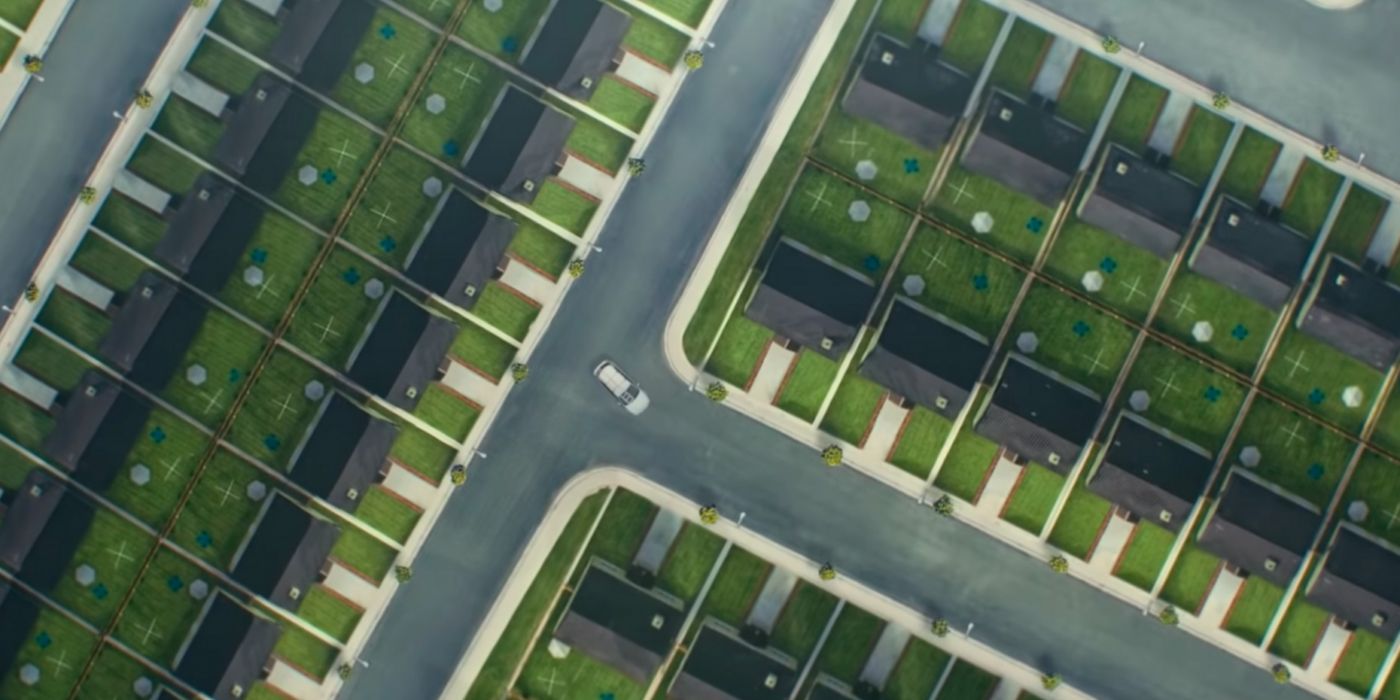While the meaning of 2019’s Vivarium movie is somewhat elusive, an examination of the overall plot and ending does shed considerable light on what director Lorcan Finnegan’s film is actually about. The sci-fi film Vivarium, starring Jesse Eisenberg and Imogen Poots, focuses on the hellish suburbia that is the inescapable town of Yonder as the young couple is forced to raise an alien offspring. Lorcan Finnegan’s sci-fi thriller tells the story of a young couple trapped in a frightfully uniform suburban neighborhood that quickly reveals itself to be a nightmare.
The Vivarium movie centers on gardener Tom (Jesse Eisenberg) and kindergarten teacher Gemma (Imogen Poots), a happily unmarried couple who are looking to become homeowners. This leads them to visit a deeply strange estate agent named Martin (Jonathan Aris), who makes lavish promises of the beauty and perfection of a newly built development named Yonder and coaxes them into taking a tour of the Stepford Wives-type community. In addition to Vivarium’s high Rotten Tomatoes score garnered by the deeper Vivarium movie meaning, Stephen King, the renowned horror author, has also expressed his love for the movie.
What Happens To Tom And Gemma In Vivarium
They Are Forced To Look After An Alien Child They Don’t Want
Vivarium‘s Yonder is comprised of endless rows of wholly identical homes and roads that always lead back to the same place. Martin leaves Tom and Gemma at house number 9, and the two try to leave but end up going around in circles, which forces them to stay in the Yonder home. Since their attempts to leave end in continual failure, Tom tries to burn down the house out of frustration.
Tom becomes obsessed with their escape and begins digging a hole in their yard, while Gemma attempts to care for the child while maintaining some autonomy in the situation
The next morning, it’s still there, seemingly rebuilt overnight, and now there’s a box with a baby boy waiting for them. Attached is a note, which is integral to the Vivarium movie meaning:
”
Raise the child and be released
.”
In the suburban satire Vivarium, Yonder’s nameless offspring (Senan Jennings) rapidly grows in size and has an eerie adult-like voice that perfectly mimics both Tom and Gemma. Jesse Eisenberg’s character spurns any attempt at fathering the child, while Imogen Poots’ Gemma is worn down into a drudging facsimile of motherhood.
The Boy screams until he is fed, he refuses to leave Tom and Gemma alone, and he copies their every move. Tom becomes obsessed with their escape and begins digging a hole in their yard, while Gemma attempts to care for the child while maintaining some autonomy in the situation, further adding layers to the Vivarium movie meaning.
Related
Best Horror Movies On Netflix
With all the streaming content out there, you’re bound to find a great horror film to enjoy for the season and Netflix is the best place to look at.
What Happens In Vivarium’s Ending
The Boy Kills Gemma & Tom Before Taking Over Martin’s Role
Inspired by Village of the Damned, in Vivarium, The Boy vanishes from Yonder and returns with a book full of symbols. In an attempt to find an escape, Gemma plays a game with The Boy to get him to reveal where he’s been; only for him to begin mutating into a monster. The boy suddenly grows into a full-blown adult. Tom still digs his hole from morning until night, and eventually, The Boy locks his “parents” out of the house. He starts disappearing every day and Gemma’s attempts to follow him prove fruitless.
Shocked and disgusted, Gemma becomes furious enough to attack him with a pickaxe, but he escapes by pulling up the pavement like a rug and sliding into an Escher-esque underground.
Eventually, Tom’s hole yields a discovery of a corpse in a body bag, adding a level of horror to the Vivrarium movie meaning. His own health rapidly worsens, and he eventually dies in the Black Christmas actress’ arms. At that moment, having said that it’s time for him to be “released,” The Boy returns to them with a body bag. Shocked and disgusted, Gemma becomes furious enough to attack him with a pickaxe, but he escapes by pulling up the pavement like a rug and sliding into an Escher-esque underground.
Gemma follows and discovers that Vivarium‘s Yonder is full of endless parallel worlds where couples like her and Tom are stuck in identical situations. At this point, it’s clear Vivarium‘s alien invasion takes young couples captive as specimens in a deeply horrific experiment. Every single one of them is miserable, some even to the point of suicide. It’s this stark imagery that promotes the Vivarium movie meaning, as Gemma has lost all autonomy and finds that she and Jesse Eisenberg’s character are not the only victims of this horrific place.
Gemma is spat back into her world and dies at the hand of The Boy after being vacuum-packed in a body bag. He dumps their bodies in the hole that Tom dug, then leaves Yonder to return to the real estate office. There, Martin is old and on the verge of death (though only a year has passed). He passes on his name badge to The Boy and then dies, leaving the new Martin to take his place. A couple walks into the real estate office, and the cycle begins again. Imogen Poots explained in an interview with Collider:
Considering the time we’re in right now, it’s a film that has the ability to, like a barnacle, latch onto the latest horror show that’s occurring, whether that be the housing crisis, or whether that be the expectation on gender roles. It can shape shift, in that way. I’m with you, when it comes to the young couple buying a house. From the outside, they’ve reached paradise. They’ve got this lovely house, they’ve got a child, they’ve got food delivered and cable TV. It should be like paradise, but it’s actually hell because of the claustrophobia and the repetition. I think that was there, in the beginning. It just had to come alive.
The Boy’s Identity & Yonder’s Purpose
Yonder Is A Trap That Forces Couples To Raise Parasites Like The Boy
While it’s never made explicit in Vivarium‘s ending, the best interpretation of Yonder, the strange boy that Tom and Gemma are forced to raise, and the Vivarium movie meaning is an AHS season 2-style alien abduction story. Based on Vivarium‘s ending, it seems that these aliens age rapidly, growing to adulthood within a year and declining from middle age to old age within the same space of time. The aliens sustain themselves by trapping human couples in Yonder and forcing them to raise their weird children in order to continue the parasitic cycle.
The aliens do not appear to form any kind of emotional attachment to their adoptive parents and do not grieve for them when they die. Further proof of the alien abduction theory comes in the form of the strange language that appears in the boy’s book and the patterns that show up on the TV. The Boy scuttling under the sidewalk and his horrific transformation adds to this Vivarium theory too. The impossible space that Gemma stumbles into when she tries to chase the boy seems like an alien construct, as does Yonder itself.
The
Vivarium
movie meaning takes the behavior of the cuckoo and reimagines it as an alien or extradimensional species
The film explores Yonder’s purpose through the metaphor of brood parasitism, a natural phenomenon in which some birds will lay their eggs in a stranger’s nest in order to trick the other bird into raising their young. Vivarium opens with a shot of a newly hatched cuckoo pushing other baby birds out of the nest. The cuckoo eventually becomes so large that when its adoptive parent returns to feed it, the cuckoo looks like it’s about to consume the adult bird’s head — foreshadowing Vivarium‘s ending.
The Vivarium movie meaning takes the behavior of the cuckoo and reimagines it as an alien or extradimensional species like that of the Invasion of the Bodysnatchers ending that have invaded Earth and forces humans to raise its offspring by trapping them together in a “nest.” Taking from influences like Village of the Damned, just as some female cuckoos are able to lay eggs that resemble the eggs of the bird species whose nest they are left in, the boy’s species is able to imitate humans closely, but not perfectly.
What Is Martin In Vivarium?
He Is An Alien Species & A Yonder “Success” Story
Martin is only seen in the very beginning and ending of Vivarium, but his odd character has a larger purpose within the overall Vivarium movie meaning. His bizarre mannerisms, personality, and origins are only made clear when The Boy reaches adulthood. Martin and The Boy are the same exact thing: an alien child raised by unwilling humans. It’s made clear during Gemma’s descent that many other families probably don’t succeed in raising their prescribed offspring.
While it’s never explored what happens to those children in Vivarium’s weird horror movie ending, Martin is an example of a Yonder “success” story. The alien species seem to maintain their invasion through this strange life cycle. Martin is an alien offspring that a previous Yonder family raised to completion, like The Boy. In Vivarium‘s ending, The Boy takes his place as the new Martin, in order to attract new victims to make the next Martin. It’s an explosive revelation that only sheds further light on the Vivarium movie meaning.
The Real Meaning Of Vivarium’s Ending
The Movie Plays On Young Couple’s Fears Of Suburban Life
At its heart, the Vivarium movie meaning is a familiar story about the smothering confines of a supposedly ideal life that’s been commoditized for the masses. The white picket fence dream remains a potent force in society, and it’s one that’s become ever more unattainable to the younger generations, making the forced fantasy all the crueler. Like David Lynch’s Eraserhead themes, Tom and Gemma are literally stuck in this heteronormative structure of what a couple is “supposed to do” as they get older.
Tom and Gemma have been forced into the suburban life in Vivarium, a home they despise, a routine they grow resentful of, and a child neither of them wants. In the thriller movie Vivarium , they are now stuck on a path for life that is both mundane and horrifying: One that ends in their deaths and their bodies left to rot. They aren’t alone in this nightmare either, as the parallel worlds of Yonder reveal. This is the world that awaits the white heterosexual middle-class couples to whom this fantasy is primarily sold.
Interestingly, Tom and Gemma never ask out loud why they have been trapped in the world of Yonder, adding a complacency aspect to the Vivarium movie meaning. They just get on with it because they have to. Despite Vivarium’s high Rotten Tomatoes rating and low IMDb score, This is partly what makes Vivarium so fascinating: It is keenly aware of the suffocating expectations placed upon people to adhere to societal norms, even as they become more unattainable and less desired by younger generations.
To be a parent is to be forced into a one-sided parasitic relationship that will sap you of your very life essence.
While other movies like David Fincher’s Fight Club explore similar themes, Vivarium also tackles the complex subject of parenthood. Here, to be a parent is to be forced into a one-sided parasitic relationship that will sap you of your very life essence. Tom and Gemma did not want a child but the society of Yonder demanded it, and the boy who grows in years as the days pass is unnerving, lacks imagination, and is utterly helpless without them. It’s a blunt metaphor for the realities of parenting. Eisenberg spoke with Collider about the Vivarium movie meaning, explaining:
It seemed like the fever dream that you’d have the night before you got married or had a baby or bought a house. It’s like the unconscious fears we all have about making commitments in our lives, even if it’s a commitment that you’ve chosen, the partner you chose, or the house you wanted to buy or live in. It’s just one closer step to your own mortality. So, I just thought it was this brilliant nightmare of that, like the brilliant surrealist movies that evoke certain feelings for us, just through symbols rather than through a more literal depiction of scary, or a literal depiction of a commentary on modern life.
Like an episode of The Twilight Zone, there have been plenty of tales about the hell of suburbia, and the Vivarium movie meaning is not shy about wearing those influences on its sleeve. Blue Velvet comparisons are easy to make, and the film is also reminiscent of classic sci-fi horror movies like Village of the Damned, Rosemary’s Baby, and Invasion of the Body Snatchers. Vivarium is a film with the sheer guts to position the act of being parents as potentially the worst thing one could do with their life.
That remains one of society’s true taboos, and the Vivarium movie meaning pulls no punches with it. Even when Gemma shares tender moments with the boy in one of the best sci-fi movies of 2020, she absolutely refuses to let him call her his mother. Her dying words to him are just that: “I am not your f***ing mother.” It’s a final act of defiance that verbalizes countless people’s lives, both within Yonder and in the real world.
Why Vivarium Blew Stephen King’s Mind
Yonder Is Clearly Influenced By A Lot Of King’s Work
Back in 2020, Stephen King tweeted: “VIVARIUM (Hulu) blew me away. Rich and strange. If you love it, thank me. If you hate it, don’t blame me,” and this is likely due to Vivarium‘s shared themes with many Stephen King book-to-movie adaptations. Indeed, Yonder’s suburban trappings, hidden horrors, and twisted conspiracies are somewhat reminiscent of films like Pet Sematary, It, It: Chapter Two, Children of the Corn, and even Firestarter.
Furthermore, despite how the Vivarium movie meaning was clearly inspired not just by Stephen King’s work, but also by the decades of horror movies and series that came before it, Vivarium still succeeds at telling a truly original and compelling tale about alien invasion while also examining the dark side of certain societal norms. Not surprisingly, many who saw the movie agree with King’s stellar review, which is reflected in Vivarium‘s solid Tomatometer rating.
How Director Lorec Finnegan Explains Vivarium’s Meaning
He Thinks It’s OK If Audiences Interpret It Differently From Him
Writer/director Lorcan Finnegan sat down with Collider to discuss the Vivarium meaning, and his comments were quite enlightening. Finnegan believes the movie is open to interpretation and that even if filmmakers’ ideas didn’t align with those of audiences, it doesn’t necessarily mean that either party is incorrect. Horror movie director Finnegan got the idea for Vivarium from his short film Foxes, where he discussed many of the housing developments made in Ireland in 2008, just before the economy crash. Due to the economy, many of these cookie-cutter developments ended up completely empty — just like Vivarium.
After throwing around ideas about the overall loss of community in society and people feeling “trapped in social contracts,” Finnegan developed the idea that Yonder would be like the empty developments but stuck in a sort of quantum bubble. He explained that the Vivarium movie meaning plays on young couples’ most potent fears about life on an existential level. While he didn’t really go into what Martin or the Boy is, alien or otherwise, he did mention that they may be another species of human that branched off and lived alongside humanity for years. Finnegan said:
And then we were also thinking, ‘What is it that young people are afraid of these days on a more existential level?’ Are they afraid of big weird winged creatures or are they afraid of their lives becoming repetitive and boring, and all their hopes and dreams getting sucked away by making a couple of wrong choices? Or being tricked into a situation that they hadn’t quite predicted that they’d end up getting stuck in. So we were trying to create a monster that would be relevant for that story, and kind of represent consumer capitalism and all of that stuff. Around the same time, Garrett and I were watching this documentary about the lifecycle of the European cuckoo. That kind of opened a door towards something else, which brewed parasitism and ultimately led to the creation of this estate agent as the antagonist, or the antagonistic species in the film.
The Credits Hint At The Vivarium Ending Meaning
XTC’s “Complicated Game” Reveals The Real Meaning Of Vivarium
As the credits roll after the story is over, the song that soundtracks the credits hints at the real Vivarium meaning. The song is “Complicated Game” by XTC. The lyrics in the middle of the song read, “it’s just a complicated game,” and verses include discussions about choices or lack thereof in a cruel and heartless world. That’s essentially the Vivarium movie meaning, as Tom and Gemma think they have choices, but that’s just a fallacy, and they’re ultimately playing a “complicated game” where they’ll ultimately and inevitably lose.
How The Vivarium Ending Was Received
Like The Rest Of The Movie, The Vivarium Ending Was Divisive
2019’s Vivarium was a somewhat divisive movie, although those who responded positively to it were instant fans. Somewhat surprisingly, given how vocal many of its fans are, the film only has a 39% audience score on Rotten Tomatoes, with a somewhat more forgiving 72% critical score. Whether the ending of Vivarium was poorly received or not is difficult to determine, too. While it’s rarely specifically mentioned in the positive or negative reviews, it also factors into the aspects of director Loerc Finnegan’s sci-fi that equally enrapture or repulse viewers, depending on their response.
It’s no secret that Vivarium is an incredibly surreal movie. The plot is incredibly ambiguous at points, though as a film it simply wouldn’t be as memorable if it played things safer and presented itself in a more straightforward manner. It’s this trait that’s made Vivarium so divisive. Some viewers simply didn’t get what the movie was trying to say, and hoped for a more stereotypical viewing experience after being drawn in by the premise.
On the other hand, this artistic ambiguity is the very same element of Vivarium that’s led so many fans to become outspoken supporters of the strange psychological thriller. Positive reviews all cite Vivarium’s dreamlike quality (and, indeed, at times nightmarish tone) as the key reason it should be hailed as a success for Finnegan as a director.
The ending plays into both sides of the coin with responses to Vivarium, though neither the critical nor celebratory reviews seem to cite it as the defining trait. For those critics or viewers who hated the strangeness of the film, the ending was simply a final frustrating note in a movie full or jarring moments. The audiences and reviewers who loved the movie, on the other hand, view the climax of Vivarium as the satisfyingly weird cherry on a cake baked with unapologetic oddness.



